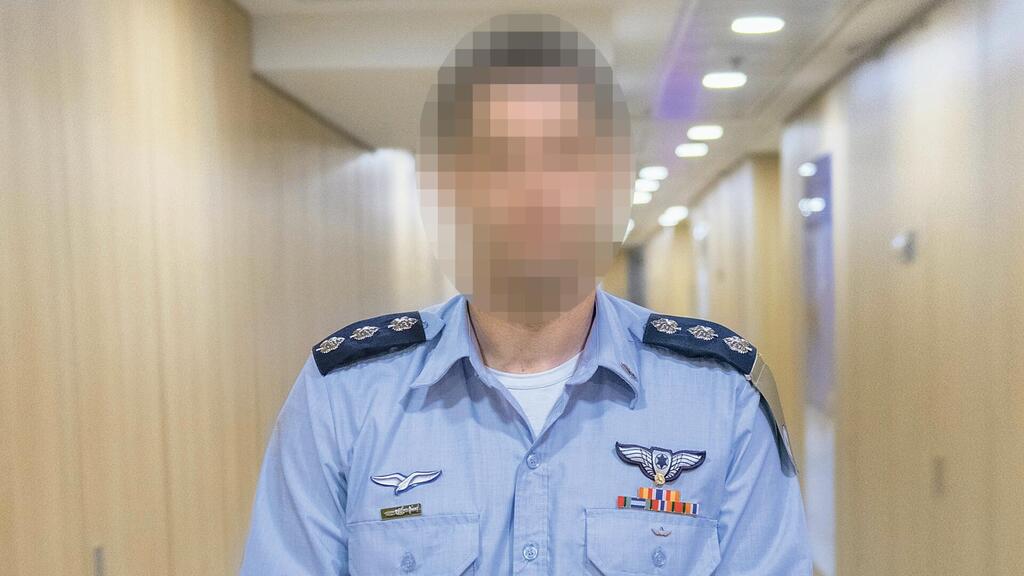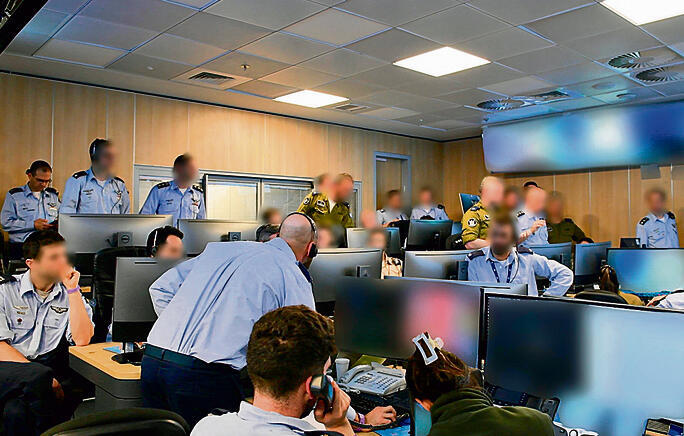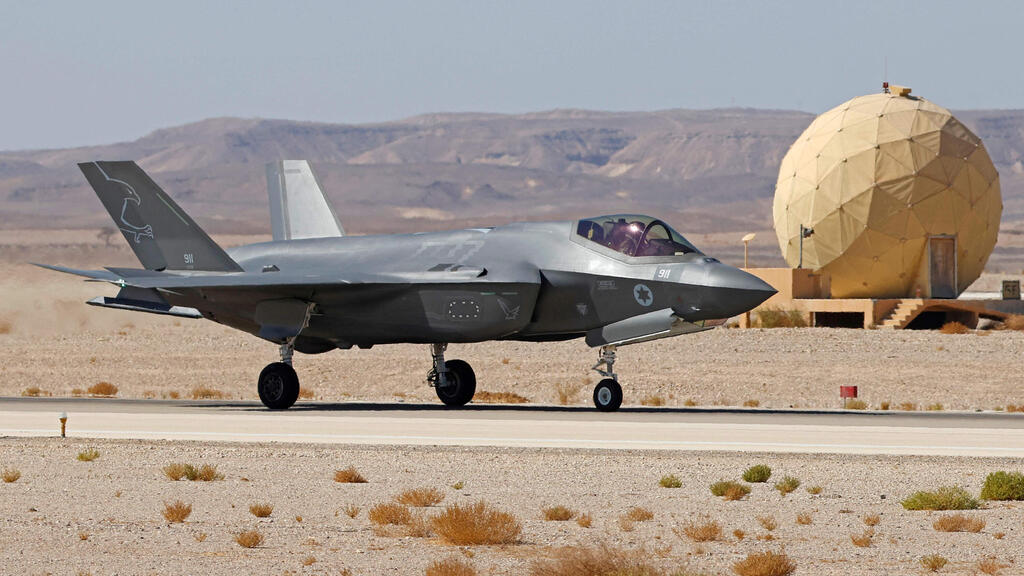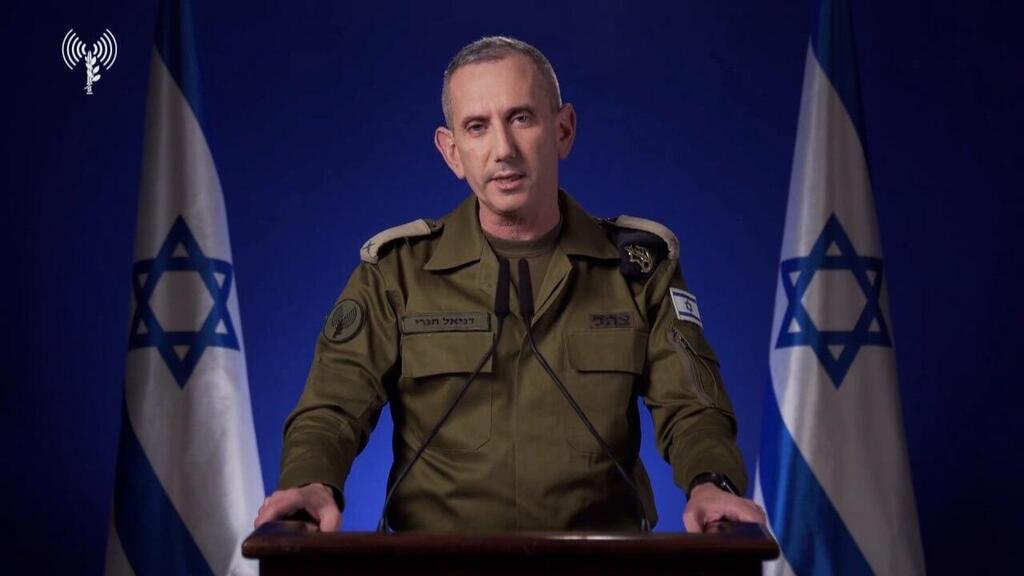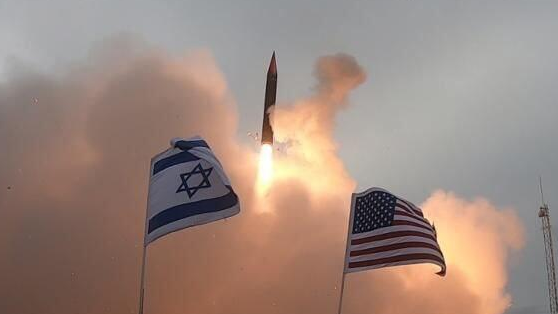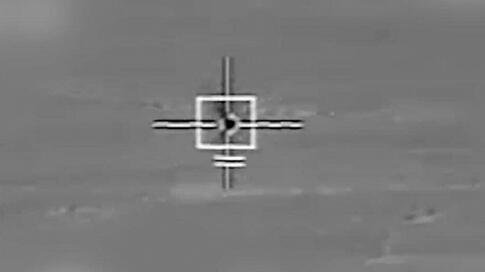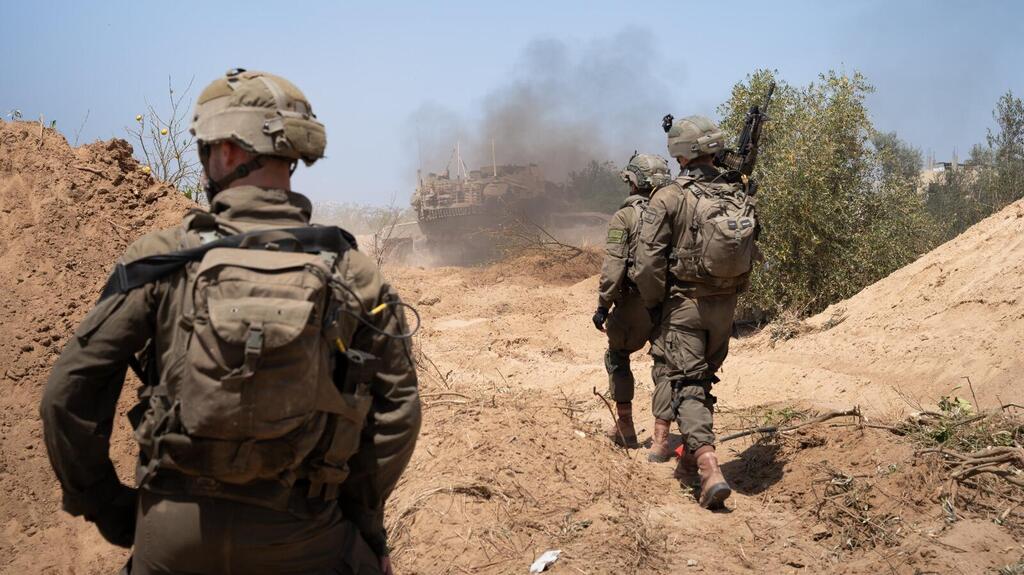Getting your Trinity Audio player ready...
On Friday, exactly two weeks ago, Colonel A., 44, - chief of the Israeli Air Force Air Defense Command - gathered his men for a departmental briefing. "We’re on the eve of war with Iran and Hezbollah," he told them. "Tomorrow, if Iran's attack plan succeeds, the prime minister will decide how to respond. If we manage to stop this plan, we will likely prevent war. War will be the price of failure if we fail in our defense tomorrow. It's in our hands."
His eyes are red. Very red. He's had almost no sleep in the past three weeks. Since receiving military intelligence that, Iran is planning a response against Israel following the death of its senior officers in a Damascus strike, he has entered "combat mode." "I haven't seen my kids in two weeks," he says. "I've been here since the moment the notice came in."
And he has a good reason for that. Col. A. is essentially the man responsible for defending the State of Israel’s skies, from a small drone to a ballistic surface-to-surface missile capable of carrying about 400 kg of explosives.
After the unprecedented success in thwarting the Iranian attack, Col. A. reveals the preparations made for the complex defense operation, explaining what worried him most, how they operated so many forces simultaneously from the Air Force control room, and admits: "I was also surprised that the operation we built worked exactly as planned. In the last briefing, I told all the partners that it's just like a combat flight. Before every such flight, there's a briefing, but many times there are changes in the operation, and the pilot needs to adapt and respond to the situation accordingly. Not this time. Everything was exactly like in the drills and simulations."
The 'team' and the coalition
He is married, and a father of three. He grew up in Kibbutz Ein Gedi and currently resides in a kibbutz in central Israel. A combat pilot flying F-16I fighter jets, he was the commander of a squadron of pilots, served as the head of the Air Force's air support branch, and has been the man trusted with Israel's airspace security for the last year and a half.
Occasionally - including, of course, in the current war - to maintain operational readiness, he arrives at his squadron and goes out on various bombing missions in the Gaza Strip or in Lebanon.
When did you start preparing for a possible Iranian attack?
"We planned this operation for a week and a half, from the moment we received the military intelligence. We had three or four notices on the way, in which we already thought it was already happening.
"The intelligence estimated the plan would be very intense and was constantly growing in scope in light of the Iranian statements. We understand this was heading toward a severe scenario - probably hundreds of UAVs, 100 ground-to-ground missiles, and between 30 to 40 cruise missiles. To prepare for such an attack, a very broad, even full, deployment of the Air Force is required. All possible defense systems must be ready."
How do you prepare for something like this?
"We constantly refined the plan. There are a lot of components in it. Over a hundred fighter jets, refueling jets, helicopters, intelligence, GPS jammers. We conducted exercises for all these units. We modeled the attack every night - we sent our mini UAVs to fly in the Negev and mimic the Iranian UAVs, and we brought the fighter jets up to practice shooting them down and operating in night conditions, at low altitude, and with a large number of targets. We conducted such models both in the air and in simulators at most times."
Trying to harm Israel, Iran used three tools: kamikaze UAVs of the Shahed 136 model, capable of reaching Israel from Iran within six to seven hours; cruise missiles, which required about two and a half hours to reach; and ballistic missiles, which were much faster.
"The Iranian launches were graded," explains Col. A. "They synchronized it so that everything would reach us together, and then, of course, it's much harder to neutralize it. From the outset, I emphasized to the people working in the control that we can’t give up even if we fail to intercept a target.”
“We needed to continue to act, to be determined and focused, to watch for more incoming targets and engage them. I explained there would be no 'zero hour'. The defensive line is always meant to be breached. But we have a whole night ahead, and we must not break down. We continue to fight, even after reports of hits."
"The team," as Col. A. calls those dozens of people - most of them experienced reservists - who were selected to man the control room at the Air Force Base on the night the Iranian attack was launched. "We also conducted three or four simulations of that night with this team, like those the field units operating on the ground had," Col. A. recounts.
"We wanted them to have personal familiarity because it always facilitates work, and also for them to be intimate with the airspace they were about to operate in - where the recovery zones are, where there are flight restrictions. The Combat Operations School provided us with similar targets, and we practiced dealing with a load of them, decision-making, and distributing targets among different systems. We were really prepared for it."
You also receive international assistance from a coalition of partners.
"Kurilla (General Michael Kurilla, chief of the U.S. Central Command) came to Israel, and we built a joint defense plan with them. When he arrived, we wanted to present our plan to him, but he said, 'Excuse me for a moment,' opened his computer, and simultaneously connected to four of his commands in different areas in the region, each of them presented the plan they built, and it completely proved itself.”
The Americans told us they’re also bringing in the French and the British to participate, and they are also increasing their manpower present in the region. That's a significant force multiplier."
How many rockets and UAVs did the international coalition intercept?
"They hit a nice quantity of targets, but we took care of the main mass. Together, we defined in which points they should take charge of, for example, on the stream from Iraq, which we thought they would arrive from. It also gave us an indication of the route of those UAVs that weren't intercepted along the way, and we already knew where to wait for them.
“We had information about hundreds of assets expected to attack from Iran, but we didn't know in which way. The other forces that patrolled the area identified, destroyed, and reported, helped us understand their route, build an estimated path, and detect them."
'That was our worst nightmare'
At 23:00 on that Saturday night, when IDF Spokesperson Rear Admiral Daniel Hager went on air and announced that dozens of missiles had been launched from Iran and were making their way to Israel, Col. A. and his ‘team' were already deeply immersed in the control room. Israeli Air Force Commander Major General Tomer Bar was also there, alongside Air Force Chief of Staff Brigadier General S.
"In our assessment, we predetermined that at 1:30 a.m. we would see the first detections," describes Col. A. "It's an amazing precision. We had the first interception of a cruise missile at 1:28 a.m. And then, one after the other, another 30 cruise missiles were launched within a quarter of an hour. Simultaneously, by 1:36 a.m., more than a hundred surface-to-surface missiles had already been launched.
"It was a crazy event," Col. A. says about those hours. "All of Israel's airspace was closed. We also recommended our partners do the same, and they did. Even the Iranians, who likely feared would strike at them as a preventive measure, diverted their planes."
Describe what was happening in the control room during those hours.
"When there's one target you need to intercept, it's relatively easy, but to intercept such a quantity of targets in such a tight airspace is very, very complex. Our combat aircraft are flying and intercepting targets in the same airspace where we’re intercepting targets with our defense systems - Iron Dome, David's Sling, Patriot, and Arrow, and there are also reconnaissance aircraft in the air. A lot of forces are operating simultaneously.
"Our biggest concern was downing a friendly aircraft. That was our worst nightmare. There's a lot of our own firepower in this tight space, and we worried our missiles would hit our own planes, or that our planes would launch against each other or collide. The missiles fired from the defense systems actually pass through our combat aircraft, flying at very low altitudes, and in the dark in the area.
"The execution is also out of our hands. The field units, and the batteries, are the ones doing the work. The Air Control Units guided the combat aircraft. And the more joint units there are, the more potential for errors. So, even in all the preliminary briefings, I likened it to a football game: when you see kids playing in the neighborhood, you see them all chasing the ball.
“It’s the same here, in such a situation, when the country is under attack, everyone really wants to help. But when you see a game between top teams, you see how each player keeps their place. It's very challenging to maintain order. To maintain tactical discipline. I asked all the participating forces in advance: 'Be where they told you, wait patiently, targets will come to you.'
"It's important to remember that our defense plan operates in 360 degrees. That same night, it wasn’t only Iran that fired. There were three launches from Lebanon, each with between 25 and 35 rockets to the Golan Heights area. Only one rocket fell. The militias also fired. 30 missiles from Iraq, another three missiles from Yemen, which were intercepted in the morning near Eilat."
Videos from that same night also reveal that the work was done in complete silence. "Everyone worked with a cool head," explains Col. A. "Everyone had their headphones, working according to guidelines, as we've practiced. It was civil. No shouting, no hysteria. Assigning who takes each incoming target.
“If, for example, a fighter jet locks onto a certain target but in doing so enters the kill zone of the Arrow system, then we ask the Air Control Unit, and they inform the aircraft to 'back off, we're intercepting'. There were quite a few cases like that."
We’re treated to a rare visit to the Israeli Air Force control room, where the defense was coordinated. It's a hall, several meters below ground at the Tel Aviv military headquarters, with rows of long tables and dozens of computer screens on them.
Many screens on the walls display data on the deployment of all defense systems. With each target identified for interception, a sort of short whistling sound is heard in the room, sounding like computer games. In the video from that night, the whistles are heard rapidly, without pause, one after another. Around 350 launches were made from Iran, carrying an enormous amount of about 60 tons of explosives.
The UAVs launched from Iran are the same weapons that the Iranians passed on to the Russians for use in attacks in Ukraine. But unlike Ukraine, where the drones were launched in small numbers, Iran sent them in large quantities. "The quantity and the way they deployed them," says Col. A., "just show their understanding of our defense capabilities."
The defense operation’s success that night was unprecedented. "It's an international achievement," Col. A. confirms, "the most intense defense plan we ever had. Not a single drone or cruise missile breached our borders. None crossed the line. Zero effective hits on our territory were made. There were isolated hits, which can be counted on one hand, at the Nevatim Airbase."
Did the hit on the airbase make you feel a sense of regret?
"None. Let’s just say no one and nothing vital was hit in Nevatim. The base was already fully operational on the same day. It's important to remember what it was like here that evening. There were people living in fear, not knowing if they'd wake up in the morning. That we'd be finished. And here, in the end, such an Iranian barrage, which could have been considered a prelude to war, ended up being completely ineffective."
Were you aware of the immense fear among the public?
"I realized how scared people were only later, in the morning, when I came out of the base," says Captain D., 26, an F-16 pilot, who now serves as an officer in the Air Defense Department, operating under Col. A.
"I knew very well," Col. A. smiles. "I received about 8,000 messages from relatives which I didn't even remember existed."
Did you believe the operation would end with such a success?
"I was asking myself a lot of questions," Sergeant D. says. "What will be coming? What will we intercept? How accurate is the intelligence? The policy was 'zero hits,' but still, it's an amount of manpower that was never deployed together. I didn't think it would be so successful."
Col. A. lavishes praise on all the forces involved in the defense operation that night. "The entire air defense command shot down a very good percentage of threats that night; the Computer Service Directorate, which distributed personnel and squadrons on the field; the GPS jams; the Military Intelligence Directorate, which provided very precise intelligence; the Operations Branch and practically all the of the military branches, like the Navy, for example, who were standing ready and eventually also intercepted threats.”
On Sunday, close to 5:30 a.m., the last target was intercepted. "We waited until 6:30 a.m. to see if there were any targets we might have missed, and then we concluded that the barrage was over," Col. A. recounts. "We left some air patrols for additional security. After 45 minutes of a short debriefing, we were in the Israeli Air Force Commander’s office for an investigation into this night’s events.”
A call for humility
Despite the tremendous success achieved by the operation, Col. A., and the Israeli Air Force in general, have a crucial message that is very important to convey: "The Air Force isn’t in euphoria," he emphasizes. "There’s joy in the success, which was important to protect Israel’s citizens, strategic assets, to restore public confidence, and allow decision-makers to act calmly and manage the event as they wish, because in fact, with zero effective hits, the incident was ‘contained’.
"But we’re not at all euphoric because we've been at war for half a year, because we have dead, wounded, hostages, and goals we haven't yet achieved. It was a good and important day, but just as we don't sink into depression from a less successful day, we don't blind ourselves to success on such a night.
“Like in football, the most thankless role is that of the goalkeeper. He can excel the entire game, and in the end, one mistake will always be remembered. In contrast to the war room, where you enter, carry out the elimination, and clean it up after an hour, defense continues at all times."
Modesty is the message the Air Force seeks to convey. We should remember that even after such an extraordinary defensive operation, something else could happen tomorrow. "It's exceptional," they say about the operation, "not indicative of the norm." Tensions with Iran are very high, and the level at which all the forces operated that night is also derived from the fact they have been ready and active for over 200 days in a real, multi-front war.
The Air Force also encourages strengthening partnerships with the United States and coalition countries that participated in the operation and saw how a responsible country defends itself against enemies firsthand.
The Air Force wasn’t surprised by the strength and scope of the Iranian attack and claims that such an attack was expected in the given scenario, based on knowledge of the Iranian capabilities. The Air Force and the IDF were established to counter such a scenario. Combat pilots also received praise.
The Air Force says that alongside the highly significant attack missions and the exceptional work of the infantry, combat pilots are also very significant in defending the country's skies. In fact, there is no substitute for such flexible manpower, which knows how to be up in the air for a long time, refuel, and return to intercept threats at different altitudes using several platforms.
What will happen in a war against Hezbollah considering their missile arsenal?
Col. A.: "We'll do the best we can. We have strong defenses. This night showed that to both decision-makers here and to our enemies."



